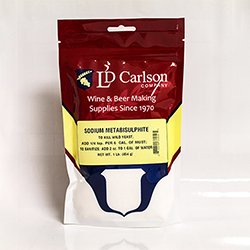Can I Use Sulfites to Sanitize Beer Equipment?
Posted by Matteo Lahm on 9th Oct 2024
 In previous discussions, we've delved into the potential downsides of using sulfites during the beer-making process. However, upon further examination, we've discovered that using sulfites as a sanitizing solution can be both safe and effective. If used properly they will not negatively affect your beer and, you can save some dough, and time. Let's explore the advantages of using sulfites for sanitization.
In previous discussions, we've delved into the potential downsides of using sulfites during the beer-making process. However, upon further examination, we've discovered that using sulfites as a sanitizing solution can be both safe and effective. If used properly they will not negatively affect your beer and, you can save some dough, and time. Let's explore the advantages of using sulfites for sanitization.
Sulfites have long been recognized for their powerful antimicrobial properties, making them a popular choice for sanitizing and preserving wine. While it's true that beer yeasts are more susceptible to the inhibitory effects of sulfites compared to wine yeasts, this risk can be significantly reduced or nonexistent with proper usage during the sanitization process.
One of the key factors in successfully using sulfites for sanitization is understanding the difference between adding them directly to your beer (which should be avoided) and using them as a sanitizing solution for your equipment. When used correctly in sanitizing solution, sulfites are unlikely to have an impact on your beer yeast. As long as you avoid adding sulfites directly to your beer, the minimal residue left on the bottles or equipment after sanitization should not inhibit the yeast's performance during the priming sugar phase nor is it enough to produce off flavors.
Now for a few considerations. If you are going to use sulfites, wear gloves and have good ventilation. They can irritate your skin and there are fumes. Also make sure your bottles and equipment are totally dry after being in contact with them. Best practice would be to use sulfites for your initial sanitation because they kill everything, and they are instantaneous. Sulfites are also very inexpensive, much less so than no rinse sanitizers. Using them for the majority of your initial sanitation process is an economical option. The only thing to avoid is direct contact with liquid sulfite solution and your beer or wort.
That said, hoses might be the exception. Getting all fluid out of long tubes is hard and while the residues are not problematic, remaining sulfite solution is a different story. It is not enough to harm your yeast, but it could have a flavor impact if your beer mixes with enough of it. How they react to aldehydes is what causes off flavors. But for everything else, like fermenters, brew pots, tools, bottles and thermometers, sulfites are a safe bet.
To mix a sanitation solution, add 3 heaping tablespoons per gallon of water. If you can keep it covered, it will last a month. That is more than enough time to utilize for the same batch for your before and after cleaning. Sanitizing your gear after you make a batch of beer is just as important. You want to make sure your equipment is free of residue before you store it. At this stage, you can use sulfites for everything because it will have ample time to dry. Since sulfites are instantaneous, this will save you time. Many bacteria will just stay dormant when your gear is stored but will reactivate once hydrated and with the availability of starches. Bacteria also can bore their way into any plastics and the longer they stay there, the harder it is to eradicate them. Dirty gear is harder to get clean before starting a new batch so due diligence is advised. This is where sulfites are very effective because they leave a film that is bacteria resistant. The old expression, "cleanliness is next to godliness" is doctrine when it comes to beer making. Regardless of your religious persuasions, if there is a beer god, he's definitely a neat freak.
For cost savings, you should use Sodium Metabisulfite. It is cheaper than the Potassium version and will do the same job for sanitation. Winemakers will often opt for Potassium because it works better as a wine preservative, which does not apply to you.
For your ongoing sanitation like the bucket to keep your mash paddle, spoon or the spray bottle to give that last insurance sprits to a hose that may have touched the table, use a traditional sanitizer like Star San or Iodophor. They can be used wet with beer.
With all this in account, you now have another sanitation option that is quick and can save you cash. Cheers!


